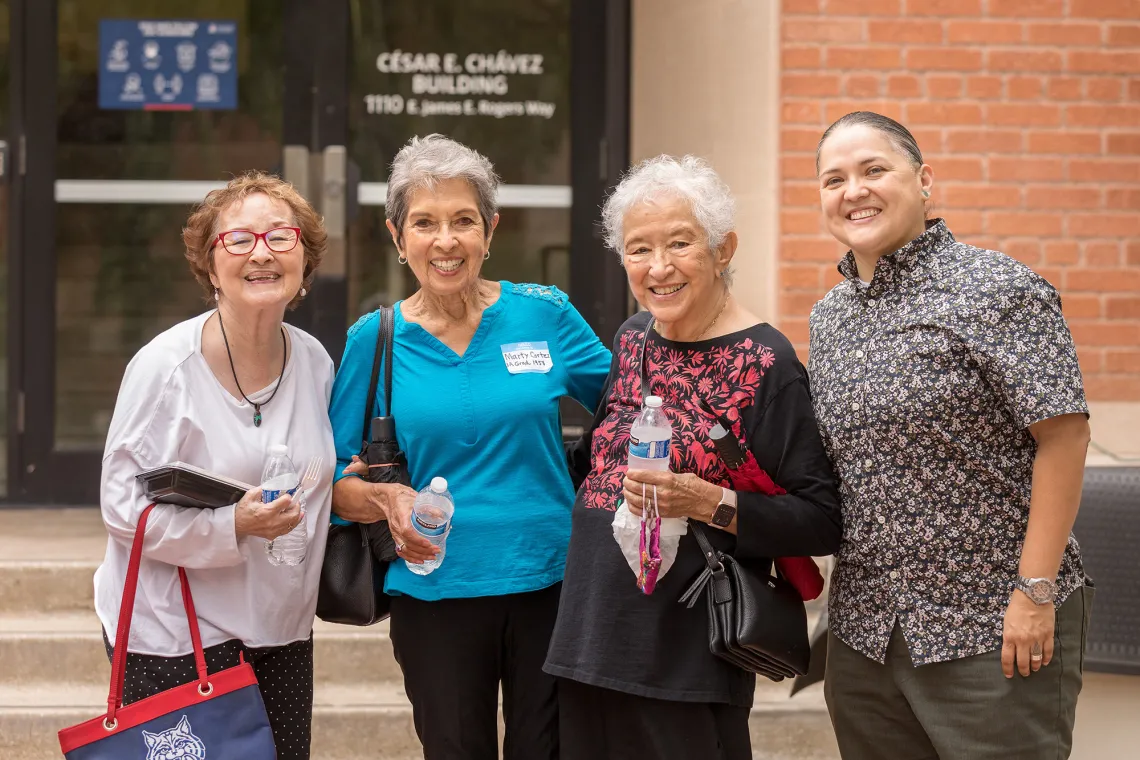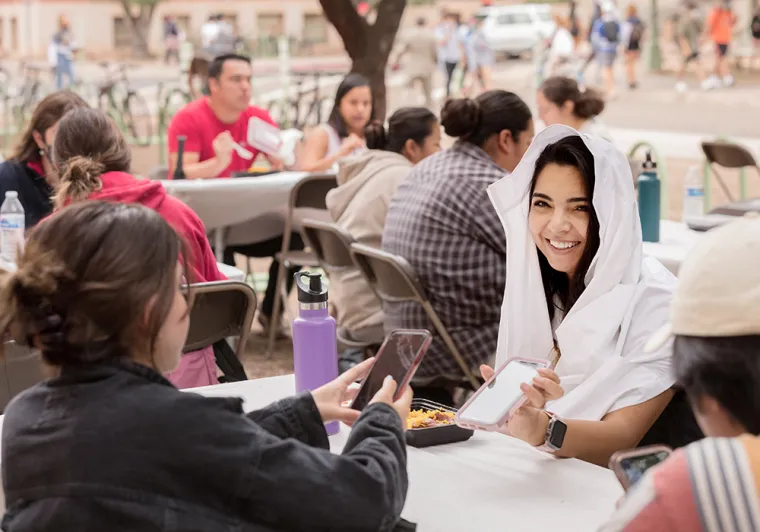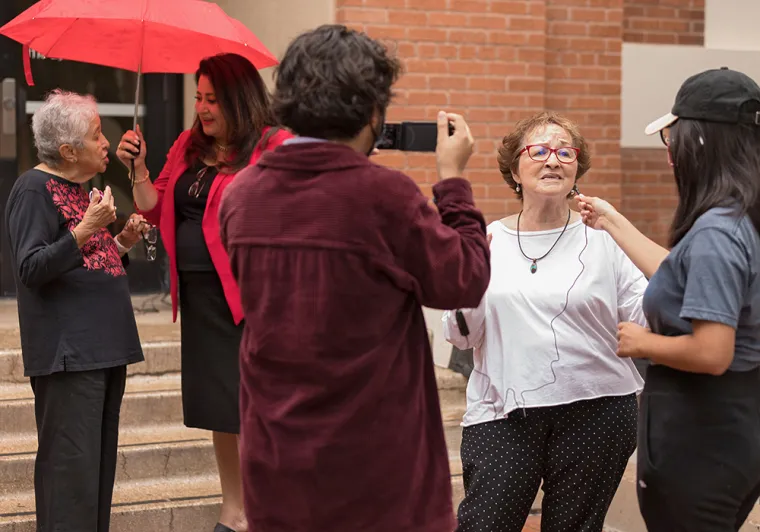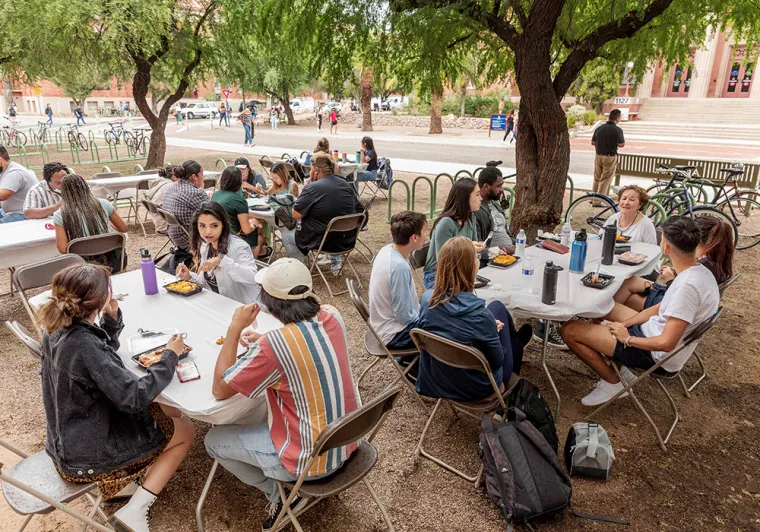Nourishing the Next Generation
Supporting Latinx/Hispanic students from arrival through graduation — and often beyond — one UArizona program creates community and boosts retention through an ingenious combination of fabulous food, cultural connection and fierce grandma love

Across cultures, food is not only a source of sustenance, but also an expression of hospitality, celebration, support and connection. With these multiple meanings in mind, local grandmothers have hosted monthly meals at the Adalberto and Ana Guerrero Student Center for years as a means of gathering and strengthening the UArizona Latinx/Hispanic community.
Part welcome for students new to the center, part reunion for regular attendees, and all neighborhood block party, these festivities halted with the onset of the coronavirus pandemic. But on a rainy fall day in 2021, COVID-19 protocols in place, the first AROMAS lunch of the school year went off without a hitch. Overcast skies were no match for the joyful mood, particularly with a campus coming back to life, sabrosa Cuban food on the menu, and the abuelitas out in force.


A long-time program of the Guerrero Center, AROMAS — or Abuelitas(os) Reaching Out to Mentor y Apapachar (“hold” or “hug”) Students — is part of a range of support for Latinx/Hispanic students, offering a familiar social setting in which students can forge friendships, explore interests, and benefit from the advice of their elders during a pivotal time of life. The program “provides an opportunity for students to see their home culture reflected on campus,” says Dominique Calza ’05 ’08, a former AROMAS participant and the Guerrero Center director.
Tradition and Innovation
Perhaps initially named for the fragrant coffee served, AROMAS began in the late 1990s as a monthly open house for students to mingle with faculty and staff at what was then the Chicano/Hispano Student Affairs office. When educator and retention specialist Socorro Carrizosa became director, she continued the tradition as a luncheon instead. Her grandmother, Marta Elias, attended the event and easily connected with the students there — both in her native Spanish and with the effusive nonverbal charm of grandmas everywhere. There was such an easy-going affinity between the students and their visitor, Socorro was inspired to invite more grandmothers — las abuelitas — to future lunches and turned AROMAS into an acronym.
Elias became the first abuelita and helped recruit others. Most were alumni or had other connections to UArizona through spouses, children, or grandchildren. Over time, the volunteer pool expanded to include abuelitos (grandfathers), too, as well as those not yet at the sage stage of grandparenthood — the madrinas y padrinos (“godparents”). They spark conversation, share experiences, and offer praise, ideas or friendly nudges, as needed. Carrizosa summarizes the role as: “It’s simply being there to ask, ‘¿Mijo, cómo estás?’”
Meals and Mentoring
For new arrivals and first-generation students, the university can seem like a foreign land. “Perhaps they’ve never been on campus or feel like they don’t belong,” says Rosalie Crowe ’58, dubbed “the OG of abuelitas” by one student. “They don’t realize everyone feels that way at first.”


For Latinx/Hispanic students, the abuelitas and abuelitos can be a touchstone, a form of extended family and a source of emotional support and practical advice about school, jobs and relationships. Often, the students and grandparents remain in touch long after their UArizona time together.
In the early years, the abuelitas cooked lunch — a free meal meant to draw students and ease food insecurity. But as the program has grown, local restaurants have provided the food. Inevitably, the welcoming atmosphere and irresistible smells entice passing students, Latinx and otherwise. The abuelitas embrace all, sometimes literally. One abuelita recalls that, when dispensing Valentine’s Day hugs on the Mall some years back, an undergrad from China exclaimed, “You look just like my grandma,” and came in for an abrazo.
Retention and Representation
At AROMAS lunches, students come for the comida and stay for the community, but the larger goal is staying until graduation. For many, just getting through their first year can be tough, particularly if finances, family obligations, legal status, loneliness, or encountering intolerance are issues.
Fortunately, focused programs like AROMAS support students at UArizona, a Hispanic Serving Institution, with a positive impact on retention. These days, first-year retention rates for Latinx/Hispanic students are on par with those of the overall university student population. And from a representation perspective, the percentage of incoming Latinx/Hispanic students in fall 2020 (29.8%) nearly matches the 30.7% of Arizonans who identified as Latinx or Hispanic on the 2020 Census.
Meal by meal, relationship by relationship, AROMAS harnesses the power of shared meals to build community, create intergenerational dialogue and strengthen commitment. As the program expands and continues to evolve, these seeds of hospitality grow and come full circle, instilling a sense of responsibility to those who come after. As Crowe explains, “This is our culture. This is what we do.”
